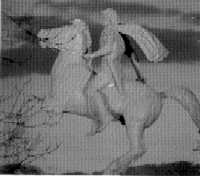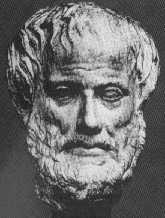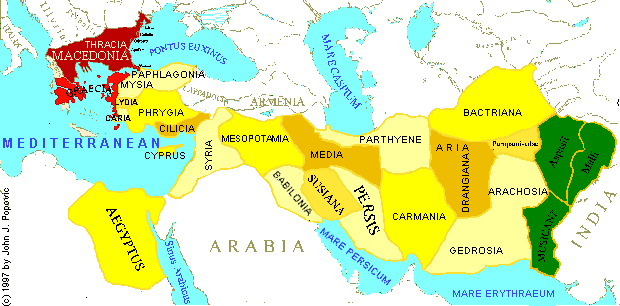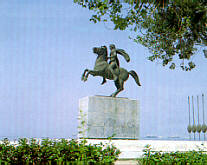 ALEXANDER THE GREAT
ALEXANDER THE GREAT
Alexandros III Philippou Makedonon,
Alexander III of Macedon (356-323 B.C.)

In history there are few persons who can be termed Great
and even fewer who deserve to be so called.
But Alexander, the son of Philip, King of Macedonians, was truly Great.
He did not merely place his stamp on his era.
Rather, he has survived - he even "lives and reigns".
THE OATH OF ALEXANDER THE GREAT
|
"MACEDONIA |
|
|
| The gold larnax from the chamber of the big royal tomb in Vergina. On the lid is the 16-pointed star, the emblem of the Macedonian dynasty |
Alexander III or as he will be called under the legendary name of Alexander the Great, was the son and successor of Philip II, king of Macedons and of Olympia and was born at Pella in 356 B.C.

He was a political and military genious and at the age of twelve he managed to tame a fierce horse named Voukefalas
which became his inseparable companion during all his expeditions.
At the age of sixteen he won a battle against the Thracians while his father was away to an expedition and when he was eighteen years old he took part at the battle of Heroneia in 438 B.C. against the Athenians and the other Greek cities-states. He was only twenty years old, in 336 B.C., when his father was murdered and became king of Macedons.

Alexander the Great carried Greek civilization to the ends of the then-known world. It is by no means a coincidence that his teacher was Aristotle, the philosopher who studied democracy more fully than any other.
Alexander used to say "I owe my father my life and my teacher my happiness". The freeing of the spirit found its continuation in the conquests of Alexander the Great. The conquest of the vast Persian Empire was of less military significance than cultural.
The then-known world acquired a unity – a unity based on Greek civilization in the Hellenistic age, which was to exert a significant influence on western civilization. Greek art is thus expanded to the East and is assimilated by local population along with the memory of Alexander.
Alexandria, Antioch, Seleucia, Pergamum, Rhodes and Corinth were transformed into centres of learning, together with the most famous of all, Athens, while the libraries of Alexandria and the other cities gave birth to the new era.
Alexander the Great died suddenly in 323 B.C. at Babylon at the age of thirty three probably of malaria.
The Great King shall survive through legends until the Middle Ages and the European Renaissance
THE OATH OF ALEXANDER THE GREAT
EMPIRE OF ALEXANDER THE GREAT

Alexander was a cultural reformer, not a militaristic invader. He instituted a multinational state comprised of equally - privileged individuals, for he was a liberator and not an enslaver. The people who became part of his empire were not considered minorities but retained their national identities.

The campaigns of Alexander the Great signaled some momentous events in world history.
For one thing Europe was decidedly alleviated from an Asian threat as the vast Persian superpower met its end once and for all. Also the expansion and eventual predomination of the Greek language as the international instrument of communication, with its concomitant knowledge, as well as the opening to Greek philosophy, art, and civilization in general,
were extraordinary events of immense consequence for the future course of the entire world.
We have to agree with H.Bengston, that: " Neither the Roman empire, nor the triumphant route of Christianity - whose communities, at the end of ancient times, extended from Ireland to India - nor even the Byzantine Empire nor the Arabian civilization would have been created without Alexander the Great and his cosmogony works.


Nowadays, however sundry pseudo - political fabrications have arisen, the existence of which serves expediencies unrelated to historical truth and aresuspicious and dangerous to stability and peace in the greater region. The fabricators attempt to usurp Alexander’s heritage through a self - baptism as his direct descendants.
Nevertheless, anyone with rudimentary historical knowledge is aware what Macedonian Hellenism and its genuine representatives Philip, Alexander and Aristotle stand for. In history and in thought it is high civilization an inseparable segment of the grand Greek miracle.
Stelios Papathemelis
A former government minister and member of the Macedonian Studies Society.

